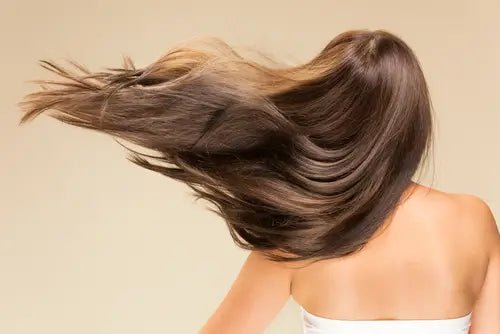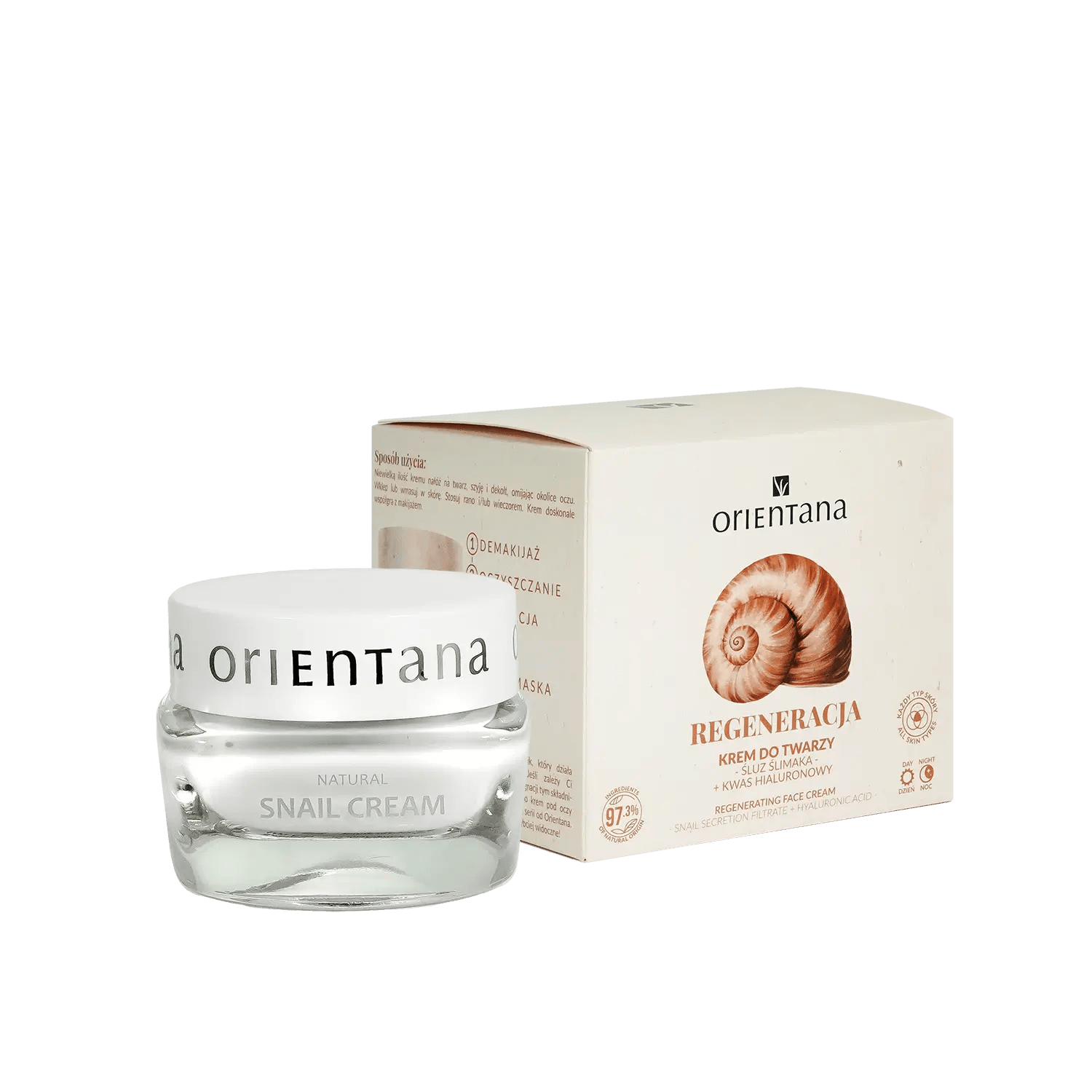Washing your hair with water alone - although it is hard to imagine, especially these days when there are thousands of brands of shampoos available on the cosmetics market - exists and has even become quite a popular trend.
WASHING HAIR WITH JUST WATER - IS IT POSSIBLE?
These are the so-called "no poo" or natural hair washing methods that limit themselves to using only water or replace shampoo with various substitutes. Some people praise such hair washing techniques, primarily because they are ecological.
Washing your hair with water only, also known as the "water-only washing" (WOW) method, is a minimalist approach to hair care that involves forgoing chemical cleansers and hair care products. Instead, you use only water to cleanse your hair and scalp. This method is gaining popularity among those looking for natural, gentle hair care methods or those who suffer from sensitive skin.
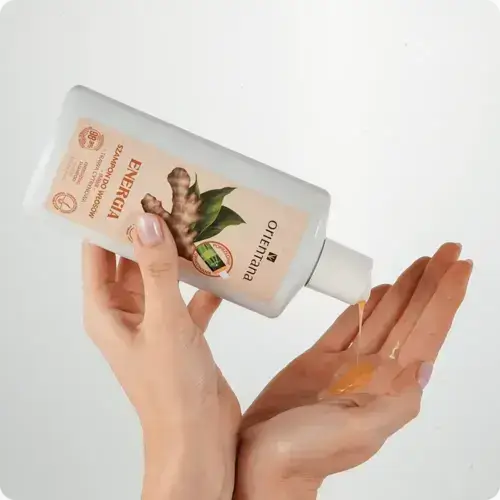
What does washing your hair with just water involve?
Washing your hair with water alone means completely avoiding shampoos, especially those containing SLS and SLES, which can dry out your scalp and hair. It is necessary to stop using detergents.
The aim of this method is to restore the natural balance of sebum production by the scalp. Sebum naturally moisturizes the hair, and the lack of aggressive cleansing agents allows it to distribute evenly.
Washing your hair with just water is possible, but it is important to brush and massage your scalp regularly. This helps distribute sebum along the length of your hair, which moisturizes it and protects the ends from drying out.
washing your hair with just water - advantages
Washing with just water has a positive effect on the scalp in particular. The sebum produced by the scalp acts as a natural moisturiser and protectant for the hair.
Washing your hair with just water does not irritate your skin. It is ideal for people with sensitive scalp, eczema, psoriasis or allergies to cosmetic ingredients.
Of course, this is an ecological and economical way. Limiting the use of cosmetics reduces waste and is environmentally friendly. You also save on buying hair products.
The WOW method is a way to reduce the oiliness of the scalp. Regular use of shampoos (mainly drugstore ones with SLS/SLES) can lead to overproduction of sebum in response to their drying effect. Washing hair with water alone helps reduce excessive oiliness.
With prolonged use of this method, hair may become thicker, denser and stronger.
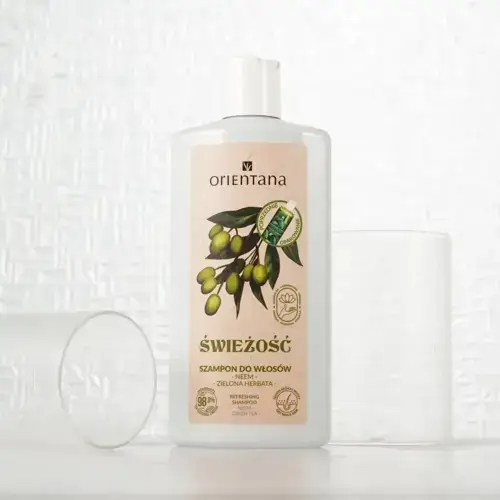
washing your hair with just water - Challenges and potential difficulties
At first, hair may look oily or dull as the scalp adjusts to the new routine. The adaptation period can take from a few weeks to a few months.
Water may not be effective enough to remove accumulated dirt, styling product residue or excess sebum, especially in the case of very oily scalp.
Hair can be rough or dull, especially if the water in your area is hard (high in minerals), which can affect the texture of your hair. Water hardness has a significant impact on how effectively your hair is washed. Hard water, which is high in calcium and magnesium ions, can cause hair to become stiff and difficult to style. Soft water, which lacks these ions, makes hair more susceptible to styling.
The WOW method is not for all hair types. Curly and high porosity hair may require additional moisture, as sebum is not always evenly distributed. Washing your hair with water alone will not work on thin hair. It may look flat.
How to effectively wash your hair with just water?
In order for washing your hair with water alone to be effective and give good results, you need to focus on hair care that supports this technique.
It is very important to prepare your scalp. Before washing, gently massage your scalp with your fingertips to stimulate circulation and loosen sebum and impurities.
Don't forget to brush your hair. Brushing your hair daily helps distribute sebum from the roots to the lengths of your hair. Use a natural boar bristle brush, which gently moves sebum.
The technique of washing with water is also important. You should wash your hair with warm water. Warm water helps dissolve sebum and impurities. You should not use hot water, which can dry out the scalp.
Washing your hair with just water requires rinsing thoroughly for at least 3-5 minutes, massaging your scalp with your fingers to remove any accumulated dirt. Alternate rinsing with warm and cool water will help seal the hair cuticles.
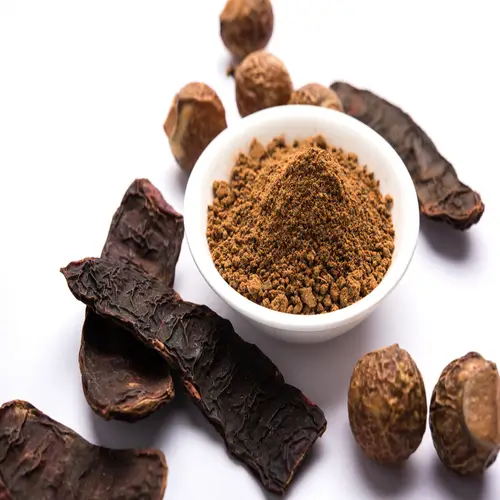
What can I replace shampoo with?
Sometimes washing your hair without shampoo is not enough. If you want to use the most natural methods of washing your hair, and using only water is not an option, you can try replacing shampoo with additives such as:
- apple cider vinegar,
- baking soda,
- soap nuts ,
- flour (potato, corn, chickpea),
- decoctions of fenugreek, wormwood, soapberry and other herbs.
Such hair washing techniques bring quite good results, although they are a bit problematic - before each hair wash you have to prepare the appropriate mixture yourself, carefully dosing the ingredients.
Home methods to improve the appearance of hair are natural rinses.
Apple Cider Vinegar: Restores the natural pH of the scalp and has a cleansing effect. Dilute 1-2 tablespoons of vinegar in 1 liter of water and use as a rinse after washing.
Lemon Juice: Helps reduce excess sebum.
Nettle or chamomile infusion: Strengthens hair and soothes scalp irritation.
When washing your hair with just water, it is worth doing a scalp scrub from time to time, e.g. with sugar and coconut oil) to remove dead skin and impurities. Made from natural ingredients, it will be both ecological and healthy.
How to Wash Your Hair Without Shampoo - DIY
The baking soda washing method, while controversial, does have its supporters. Baking soda acts as a natural exfoliant and cleanser, helping to remove excess sebum, dirt, and leftover styling products. It also has odor-absorbing properties, which can help refresh the scalp. Using baking soda can make hair appear fuller and lighter.
Preparation of soda solution
- Dissolve 1-2 tablespoons of baking soda in 1 cup of warm water
- Apply solution to wet hair and scalp.
- Gently massage your scalp for 1-2 minutes.
- Rinse thoroughly with warm water.
This method has many supporters, but dermatologists warn that the high pH of baking soda can lead to scalp irritation and hair damage. This method should be introduced on a trial basis.
Washing your hair with soap nuts is a natural method of cleansing the scalp and hair that is gaining popularity among people looking for eco-friendly and gentle alternatives to traditional shampoos. Soap nuts (also known as Reetha or Sapindus Mukorossi) contain natural saponins that act as a gentle cleansing agent.
Soap nuts come from the Sapindus Mukorossi tree, which grows primarily in India and Nepal. They have been used for centuries in Ayurvedic hair and skin care.
Soap nuts cleanse the hair and scalp without damaging the natural lipid barrier. They are an excellent alternative to shampoos containing SLS and other strong detergents. They are a 100% natural washing agent.
Regular use helps regulate sebum secretion, making hair less oily. Saponins contained in nuts give hair softness and natural shine.
Soap nuts, thanks to their antibacterial and antifungal properties, help fight dandruff and scalp irritation. They are environmentally friendly - they can be composted after use.
Preparation of reetha mixture
- Soap nuts are available in powder form.
- Mix 1-2 tablespoons of Reetha powder with a little water to form a paste.
- Apply the paste to your scalp and hair, massaging gently.
- Rinse thoroughly with warm water.
Soap nuts have light moisturizing properties, so many people don't feel the need to use conditioner. These nuts can be purchased at organic food stores.
Washing your hair with just flour
Flours absorb excess sebum and impurities, gently cleansing the scalp without damaging its natural lipid barrier. Some flours (e.g. chickpea flour) have nourishing and strengthening properties for hair. The flour is environmentally friendly and much cheaper than most shampoos. Chickpea flour has been used in Ayurvedic hair care for centuries, which proves its effectiveness in traditional hair care methods. This method should not be used for long.
Herbal decoctions
Washing your hair with herbal decoctions is a gentle and natural care method that can replace traditional shampoos or complement them. Herbs have various properties – from cleansing, through strengthening, to moisturizing and regulating sebum secretion. The selection of the right herbs depends on the type of hair, the condition of the scalp and the effects we want to achieve.
Herbs help gently remove impurities and excess sebum without damaging the scalp's natural protective barrier. Many herbs provide nutrients that strengthen hair follicles and stimulate hair growth.
Herbs can help reduce oiliness or moisturize dry scalp. They soothe itchy scalps, help fight dandruff and irritation. Herbal decoctions give hair shine, softness, and volume.
What herbs are good for different hair needs? Nettle, horsetail, rosemary for oily hair. Chamomile, marigold and lime blossom decoctions will help with dry hair. Ayurvedic herbs – amla , bhringraj , centella asiatica – will work for hair loss. Dandruff and scalp irritation will be taken care of by the Ayurvedic herb neem.
Who is the water-only hair washing method for?
Washing your hair with water alone may work for people with sensitive scalps or those prone to allergies. It may be more difficult for people with very oily scalps, people with curly, dry or high porosity hair, which may require additional moisture. It will not work for people who use a lot of styling products (gels, hairsprays, mousses) that may be difficult to remove with water alone.
Washing Your Hair with Just Water – What to Expect?
During the first weeks of washing your hair with just water, your hair may be greasy or dull. This is because your scalp has to adjust to the lack of detergents. Sebum production gradually regulates.
Hair may feel heavy and weighed down. This may be due to sebum build-up, especially in people with oily hair.
How to survive the transition period? More frequent brushing and scalp massages will help. You can also support yourself with natural rinses (e.g. with apple cider vinegar). The most important thing is patience - adaptation can take from several weeks to several months.
washing hair with water only – indirect methods
Co-washing (Conditioner Washing)
Co-washing is washing your hair with conditioner only (without shampoo). Special washing conditioners are used that contain gentle cleaning agents but no aggressive detergents (like SLS or SLES). It works well for people with curly, wavy, dry or high porosity hair.
This method is good for those who wash their hair often and do not want to dry it out, and for people with sensitive scalp. Washing is gentle and does not remove natural oils. Hair is more moisturized, soft, and less frizzy.
OMO method
The OMO hair care method is a washing technique that works particularly well on curly, wavy or high porosity hair, but can be used by people with all hair types. The abbreviation OMO comes from the sequence of steps:
O – Conditioner: Apply conditioner to the length of your hair (avoid the scalp). This prevents your hair from drying out during washing, especially if you use shampoos with harsh detergents. This is also a good option for those with dry or damaged ends.
M – Wash: Wash your scalp with shampoo. The foam from the shampoo flows down your hair and gently cleanses it without drying it out.
O – Conditioner: After rinsing out the shampoo, apply conditioner to the entire length of the hair to moisturize and smooth. Leave on for a few minutes, then rinse.
By using this method regularly, you may notice that your hair becomes softer, more flexible and less prone to frizz.
Washing your hair with Ayurvedic shampoos without SLS
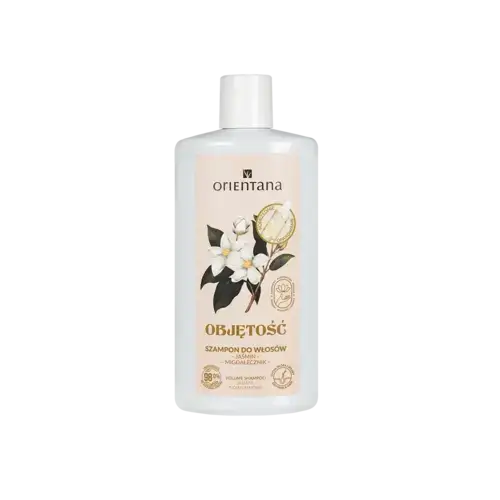
Herbal and natural shampoos containing Shikakai, Reetha (soap nuts) or clays are natural cleansing agents.
Why is it worth reaching for a natural hair shampoo? Using Ayurvedic shampoos is definitely the best and most effective of all natural hair washing methods. Thanks to it, we can not only thoroughly cleanse the scalp and hair, but also deeply nourish, moisturize and strengthen them. Additionally, natural hair shampoos have the advantage that their composition is 100% ecological, so they are friendly to our planet. As you can see, caring for the environment and caring for your hair can be reconciled.
If you have delicate hair and want to add volume and lift it at the roots, try the jasmine and almond shampoo . For oily hair , the neem and green tea shampoo will be perfect. A gentle but effective shampoo for the whole family is the ginger and lemongrass shampoo .
Washing your hair with just water is a method that can bring many benefits, such as less oiliness, natural hydration, and no scalp irritation. Washing your hair without shampoo, especially with just water, is extremely ecological, but for some of us, even in the short term, it turns out to have a negative effect on its condition. Hair becomes oily, loses volume, and over time, dandruff and other dermatological problems appear.
Washing your hair with just water is an idea that came from a reluctance to use chemical detergents and the need to take care of the environment, which the drugstore industry is doing a great deal of harm to. But we can manifest our concern for the fate of the planet in another way - instead of drugstore shampoos, it is enough to reach for their natural equivalents, for example Ayurvedic shampoos.


